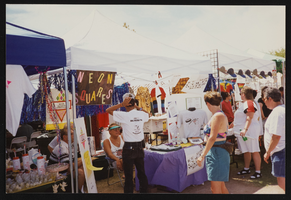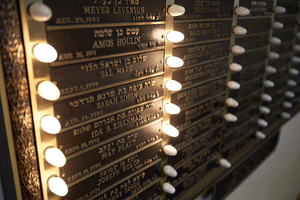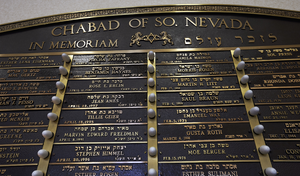Search the Special Collections and Archives Portal
Search Results

Neon Squares booth at Gay Pride: photographic print
Date
Archival Collection
Description
Image
Bill Lamb oral history interview
Identifier
Abstract
Oral history interview with Bill Lamb conducted by Roger Barnhart on June 29, 1975 for the Ralph Roske Oral History Project on Early Las Vegas. Lamb was born in August 22, 1943 in Henderson, Nevada. In the interview, he talks about his experiences moving around Northern Nevada due to his father's mining job. Lamb also discusses his education, family, military service, work in Las Vegas, Nevada casinos, and the Church of Jesus Christ of Latter-day Saints.
Archival Collection

Photograph of Chabad of Las Vegas Memoriam, Las Vegas (Nev.), September 22, 2016
Date
Archival Collection
Description
Memoriam lights honoring those who have passed as seen in the sanctuary of the Chabad of Las Vegas at 1261 Arville Street.
Image

Photograph of Chabad of Las Vegas Memoriam, Las Vegas (Nev.), September 22, 2016
Date
Archival Collection
Description
Memoriam lights honoring those who have passed as seen in the sanctuary of the Chabad of Las Vegas at 1261 Arville Street.
Image
Joel Coombs oral history interview
Identifier
Abstract
Oral history interview with Joel Coombs conducted by Claytee White on February 22, 2014 for the African Americans in Las Vegas: a Collaborative Oral History Project. In this interview Joel Coombs spoke about how his peers reacted to his interracial family. He recalls attending Valley High School amidst racial tensions, racism, and prejudice. He also spoke about the drug abuse happening at Valley High School and Bishop Gorman High School in Nevada. He recalled participating in protests as a child and landing on the front page of The Post.
Archival Collection
Amilcar "Ace" Daniels oral history interviews
Identifier
Abstract
Oral history interviews with Amilcar “Ace” Daniels conducted by Rodrigo Vazquez and Monserrath Hernández on June 15, 2019 and June 22, 2019 for the Latinx Voices of Southern Nevada Oral History Project. In the first interview, Daniels discusses growing up in Las Vegas, Nevada and shares his parents' emigration story from the Dominican Republic to the United States in the early 1980s. He talks about attending the College of Southern Nevada (CSN), the University of Nevada, Reno (UNR), and the University of Nevada, Las Vegas (UNLV). Later, Daniels speaks on his career in hospitality, his passion for live theater, and his advocacy for the performing arts in Las Vegas. He talks about being a minority person in the hospitality industry, the importance of maintaining his cultural identity, and Latino representation in theater. In the second interview, Daniels discusses his involvement with the non-profit arts organization Super Summer Theatre, and participating in the Las Vegas Pride Festival. Lastly, Daniels talks about issues of colorism in the Latinx community.
Archival Collection
William Morris oral history interview
Identifier
Abstract
Oral history interview with William W. Morris conducted by Sam King on February 22, 1979 for the Ralph Roske Oral History Project on Early Las Vegas. In this interview, Morris discusses University of Nevada, Las Vegas (UNLV) athletics department. Morris describes UNLV Basketball during the late 1970s and recalls the coaches of the team from 1958 to 1973. Morris then discusses the developments of UNLV Basketball at the time and their progress throughout the years. Later, Morris describes plans to begin construction of the Thomas and Mack Center and gives details of how funds were raised to construct the facility. Morris then talks about the integration of women sports to the athletics department and the success of women sports teams. Lastly, Morris provides his opinions on why Las Vegas, Nevada shouldn’t have a professional sports team.
Archival Collection
Earl G. Heron oral history interview
Identifier
Abstract
Oral history interview with Earl G. Heron conducted by Claytee D. White on November 22, 2024 for the African Americans in Las Vegas: a Collaborative Oral History Project. Heron recalls his childhood in Queens, New York, where he learned automobile mechanics from his father. He used that knowledge to become a mechanic on fighter planes for the United States Air Force. Heron was stationed for some time at Nellis Air Force Base in Las Vegas, Nevada. He also was stationed in San Antonio, San Bernadino, Wichita Falls, and Fort Bragg. He became a flight engineer and took part in Red Flagg War Games Training while stationed at Nellis AFB. Digital audio available; no transcript available.
Archival Collection
Mary Wesley oral history interview
Identifier
Abstract
Oral history interview with Mary Wesley conducted by Claytee D. White on October 22, 2007 for the UNLV University Libraries Oral History Collection. In this interview, Wesley discusses her early life in Quitman, Mississippi. She recalls the racism she experienced during her youth, the church community in Quitman, and traveling to Las Vegas, Nevada by train. She talks about the welfare rights movement in Las Vegas, Operation Life, and businesses on Jackson Street. Lastly, Wesley describes the entertainment on the Westside, and integration on the Las Vegas Strip.
Archival Collection

Community Church booth at Gay Pride: photographic print
Date
Archival Collection
Description
Image
